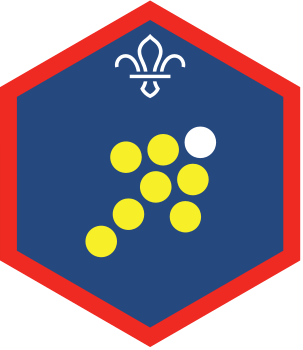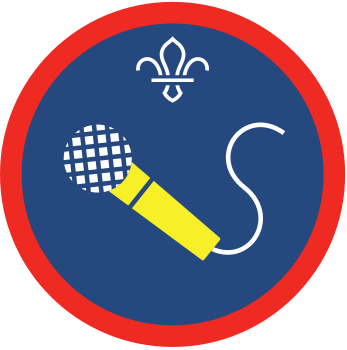Post-activity interview
You’ll need
- Pens or pencils
- Scrap paper
- Chairs
- Device to play video (optional)
Before you begin
- This activity is all about creating a space for people to share their honest feedback after an activity. It’s great for residential experiences such as Camping standards, but you could use it for any event or activity.
- The simplest way to do this activity is to jot down notes and turn them into a written interview or review. However, if people have access to devices to record and play video or audio they could use these too.
- It works well to use chairs and tables to set the scene, but it doesn’t matter if you don’t have access to them.
Share your thoughts
- The person leading the activity should remind everyone which event or activity they’ll be basing this activity on.
- Everyone should split into groups. Each group should get some scrap paper and some pens or pencils.
- Everyone should chat about how the event or activity went. Do they have any feedback for the organisers? Could anything be improved if the event or activity were to happen again? People could also think about who they’d nominate to be ‘person of the event’. Someone in each group should jot some notes down.
Get ready for a press conference
- The person leading the activity should explain that after a football match, players, coaches, and managers are interviewed by the press and media in a post-match interview. They’re asked questions about the match and how it went.
- Everyone should watch these two examples from the coaches and managers of a football team.
To watch in full screen, double click the video
To watch in full screen, double click the video
- Everyone should chat about what the post-match interviews were like. What did the press do? How did the people being interviewed act?
- Each group should choose someone to be the spokesperson. The spokesperson will speak on everyone’s behalf at the interviews, so they should feel confident that they know everyone’s views. Everyone else will be a reporter.
- Everyone should help to set out the room so it looks like a press conference – for example, you could have a chair for each spokesperson at the front, with chairs for everyone else in a horseshoe shape.
- If anyone’s using a recording device, they should set it up.
Host a press conference
- Everyone should take their seats. The spokespeople should sit at the front of the room, everyone else should sit facing them.
- The people leading the game should take it in turns to ask the spokespeople questions. They should start with an open question, for example, ‘tell us about the activity or event your group participated in’.
- The reporters should make sure they record people’s answers. If they have a recording device, they’ll probably capture everything. If they’re writing, it’s up to them whether they take rough notes to get the general idea or focus on writing down exact quotes.
- The people leading the game should keep asking questions and the reporters should keep recording or taking notes of the spokespeople’s answers and feedback.
Use your information
- Everyone should get back into their groups.
- Each group should review everyone’s recordings and notes. They should look for highlights, for example, interesting quotes or unexpected answers, to include in their final report.
- Everyone should decide on the style of report they’ll produce. It’s up to them whether they want to make a video, voice recording, or film. It’ll probably depend on the equipment they have and the skills of everyone in their group.
- Everyone should draft their report. They need to include the key points: what was the activity or event, a highlight, a challenge, feedback and ideas for next time.
- Everyone should work together to make their final report.
- Everyone should present their reports to the person who organised or led the event or activity.
- The person leading the activity should help everyone arrange a time for the spokespeople to meet with the person they sent their reports to. They should chat about their feedback and find out what the leader or organiser thought. Are they doing anything based on the feedback?
- The spokespeople should feed back to their groups next time they meet.
- What activity were you participating in?
- How was the activity?
- How did it feel to lead the patrol?
- What was your patrol’s highlight moment?
- Tell us about the biggest challenge your patrol faced?
- How did you keep the patrol motivated?
- What advice would your patrol give someone else doing this activity?
- What would your patrol do differently next time?
- How would your patrol improve this activity?
- What is your patrol’s feedback to the organisers of this activity?
- How did the patrol feel after the activity?
- Who would your patrol nominate as ‘Scout of the camp’ and why?
Reflection
This activity needed everyone to communicate. Everyone had the chance to freely share their opinion. How did it feel to be so open? Do people often have a chance to feed back so honestly? The spokesperson shared everyone’s thoughts to a wider audience. How did people feel about someone else speaking on their behalf? Sometimes it’s good to have someone pass your feedback on, especially if you can’t do it yourself, but it can be tricky to trust someone to represent you – there’s always a risk they won’t say things exactly as you intended them or that they’ll accidentally misrepresent your thoughts!
The spokespeople had to be great leaders in this activity. How did it feel to be trusted with their group’s thoughts and opinions? Some people may have felt nervous or under pressure to get it right, but others may have found it empowering. The best leaders make sure that everyone’s voices are heard – especially the people whose voices are often ignored. Did the leaders make sure that everyone in their group was represented? Did the leaders find it easy to remain true to what their group told them?
Safety
All activities must be safely managed. You must complete a thorough risk assessment and take appropriate steps to reduce risk. Use the safety checklist to help you plan and risk assess your activity. Always get approval for the activity, and have suitable supervision and an InTouch process.
- Phones and cameras
Make sure parents and carers are aware and have given consent for photography.
- People don’t need to write for this activity – they could record audio or video instead. If you have any shared equipment, prioritise access to it for people with additional needs.
- People could take notes on a tablet, for example, rather than writing.
All Scout activities should be inclusive and accessible.
If people got great content, they could edit it again to share with a wider audience. Who else might be interested in hearing about the event or activity? Could the interviews be edited to encourage others to take part?

